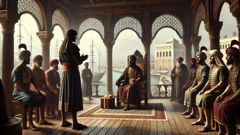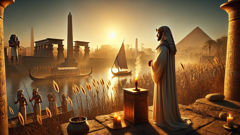Introduction
The day began with the first blush of dawn bleeding over the ancient stones of Per-Ramesses, and Wenamun stood at the riverbank, the papyrus reeds shifting around his sandaled feet. The Nile, eternal and indomitable, gleamed like a living mirror beneath the gentle sky. Wenamun inhaled the air—scented with myrrh, sweat, and the underlying tang of civilization. The city’s temples rose behind him, their flagpoles catching the breeze, the banners of the gods snapping softly. Already, the city stirred: priests chanting in the shadowed sanctuaries, fishmongers hawking their catch, children darting through the dusty lanes. Wenamun’s mind was not on these earthly rhythms. As a priest of Amun, he bore the honor and the burden of his station. Today, he was entrusted with a task that transcended daily ritual—a mission on behalf of the gods themselves. The sacred barque of Amun, the divine vessel used for the most solemn festivals, was in need of renewal. Its hull demanded the finest cedar, timber that could only be found in the far-off land of Byblos. Egypt’s forests had long since yielded to the plough; her temples reached across borders for what nature no longer offered. And so, Wenamun was chosen to journey north, to leave the safety of Egypt and travel across the sea to a world of foreign tongues and uncertain alliances. It was an honor, yet he felt the weight of expectation pressing on his shoulders like the stones of the temple pylons. He thought of his family—his wife’s gentle smile, his son’s questioning eyes, his daughter’s quiet laughter. All would wait for his safe return, but nothing was promised. The sea was a hungry god in itself. Yet there was no room for hesitation. The fate of the barque—and, by extension, the favor of Amun—rested on his success. As the crew loaded supplies onto the ship, Wenamun whispered a prayer to Amun-Re, offering incense and sweet bread at the altar. The rising sun struck the river, painting it with molten gold. He stepped aboard, his heart steadying with resolve. So began his journey—one that would test not just his faith and courage, but the delicate thread connecting empires, gods, and men.
Across the Delta: From Per-Ramesses to the Sea
The vessel slipped silently from the moorings, gliding over the Nile’s glassy surface as the first rays of morning gilded the palms and papyrus thickets along the shore. Wenamun stood at the prow, feeling the gentle roll of the water beneath his feet. The air was filled with the calls of ibises and the low grumble of the oarsmen, their dark arms gleaming with sweat as they pulled in rhythm. Behind him, the city of Per-Ramesses receded, its monumental gates shrinking into the haze. Egypt’s heartland stretched before him—a mosaic of fields and settlements, temples and tombs, all strung like beads along the river. Wenamun’s mind was restless. He reviewed the pharaoh’s letter—its official seal pressed into wax, its script precise and weighty. This document was his shield and his sword, proof of Egypt’s need and Amun’s favor. With it, he would approach the ruler of Byblos. But he knew that such documents could be rendered meaningless in foreign lands, where ambitions and alliances shifted like desert sands. As the sun climbed higher, the ship passed into the sprawling delta, where the river fanned out into countless branches. Here, crocodiles basked on mud banks, and fishermen poled their reed boats through narrow channels. The crew grew quiet, watching the shifting currents for hidden dangers. At night, they anchored in secluded inlets, and Wenamun would offer prayers by starlight, the sky stretching endlessly above. The journey was not without its challenges. In a remote riverside village, the ship was approached by a group of local officials. They demanded tribute for passage—a sign of Egypt’s fading authority in these borderlands. Wenamun bargained fiercely, offering bolts of linen and jars of honey. Yet he sensed their thinly veiled contempt. Egypt’s grip was loosening, and Wenamun felt, for the first time, the vulnerability that lay beneath his official titles. It was only with diplomacy—and a whispered invocation to Amun—that the vessel was allowed to pass unscathed. As they neared the Mediterranean, the Nile’s familiar embrace gave way to the salt tang of open water. The delta’s marshes faded behind, replaced by the endless horizon of the sea. Wenamun watched as the color of the water shifted from muddy brown to deep blue, its surface flecked with whitecaps. The crew’s mood changed; laughter grew strained, and even the most seasoned sailors glanced nervously at the swelling waves. For all its might, Egypt was a land of fields and rivers, not oceans. Wenamun had never seen such vastness. On the night before their departure into open water, Wenamun sat apart, tracing the constellations that guided sailors for generations. He thought of his purpose—the barque of Amun, the sacred heart of his people. If he failed, it was not just his name but the reputation of Egypt that would suffer. He tightened his grip on the pharaoh’s letter and whispered a promise to the god he served: he would not falter.

Peril at Sea: Storms, Pirates, and the Unknown
The Mediterranean stretched out before them—an expanse of restless blue, its moods as changeable as any god’s. For Wenamun, the sea was both a marvel and a menace. The first days passed in cautious optimism. The winds were kind, filling the square sails and pushing the ship northward along the Levantine coast. Wenamun learned to read the subtle language of waves and sky, guided by the captain, a grizzled man whose arms bore tattoos of dolphins and lotus flowers. They sailed past the coast of Dor, where traders’ fires flickered at night and the smell of foreign spices drifted across the waves. But good fortune is rarely constant. On the fourth night, black clouds massed on the horizon. The wind howled through the rigging, turning the calm surface into a heaving monster. Rain lashed down in sheets, stinging Wenamun’s face as he helped lash cargo and steady the mast. The captain shouted orders above the roar, his voice hoarse but unwavering. Lightning split the sky, illuminating the ship as it pitched and rolled, waves breaking over the sides. Wenamun clung to the rail, his prayers drowned out by the storm’s fury. In those hours, time lost all meaning. He thought of his home—his wife’s gentle hands, the laughter of his children—and wondered if he would ever see them again. As dawn broke, the storm relented. The ship was battered, sails torn, but it remained afloat. Wenamun and the crew worked feverishly to make repairs, binding wounds both physical and spiritual. It was a victory, but a costly one: several jars of tribute were lost to the sea, and two sailors nursed broken bones. They sailed on, cautious but determined. Days later, danger came not from nature but from men. A pirate vessel appeared on the horizon—a sleek craft painted with the snarling faces of sea gods. The captain urged speed, but the pirates were relentless. As the enemy closed in, Wenamun offered prayers and promises to every god he knew, Egyptian and foreign alike. But it was the crew’s courage that saved them: archers loosed arrows from behind makeshift barricades, and oarsmen strained until their muscles screamed. After a tense pursuit, the pirates broke off, deterred by the Egyptians’ resolve and perhaps, Wenamun thought, by the invisible shield of Amun’s favor. The rest of the voyage was marked by uncertainty. Supplies grew thin, tempers frayed, and Wenamun struggled to maintain his authority as a priest in a world ruled by wind and wave. Each night, he recited hymns beneath the unfamiliar stars, finding solace in ritual even as the distance from home grew with each passing day. At last, the coast of Byblos appeared—its harbor crowded with ships, its hills crowned by cypress and cedar. Wenamun’s journey across the sea was over, but his true test was only beginning.

The City of Byblos: Trials of Diplomacy
Byblos rose from the shore like a vision—its stone walls bright under the Levantine sun, terraces dotted with olive trees, and wooden docks thronged with merchants from every corner of the ancient world. Wenamun was both relieved and apprehensive as he disembarked, his sandals crunching on the gravelly beach. The harbor was alive with noise: sailors shouting, animals braying, the clang of hammers on bronze. The air was thick with scents—salt, tar, spices, and cedar resin. At first, Wenamun felt lost among so many foreign tongues. He was escorted by a local official to a modest guest house, where he refreshed himself and donned his finest linen. He rehearsed his message in Egyptian and in the halting dialect of the coastal Levant. Every detail mattered; here, a misstep could mean failure. The next morning, Wenamun was summoned to an audience with Zakar-Baal, ruler of Byblos. The palace was less grand than Egypt’s temples but impressive in its own right—carved beams scented with cedar and walls painted with mythic beasts. Zakar-Baal received Wenamun on a shaded terrace overlooking the harbor. He was a shrewd man, his eyes bright with calculation. Wenamun presented the pharaoh’s letter and gifts—incense, papyrus, and lapis lazuli. He spoke of Amun’s need, of ancient alliances and past gifts. Zakar-Baal listened politely but made no promises. He spoke of shifting powers, of tribute owed and not repaid, of Egypt’s waning influence. For days, Wenamun waited. He was neither welcomed nor dismissed—trapped in a limbo where each day brought new obstacles. Officials demanded bribes for audiences, merchants inflated prices for necessities, and rumors circulated of rival envoys offering richer tribute from other kingdoms. Wenamun’s patience was tested as never before. He visited temples, leaving offerings to Baalat Gebal and local gods, hoping to win favor among the city’s priests. He forged alliances with traders and scribes, listening for whispers of opportunity. Still, Zakar-Baal delayed. The cedar forests loomed on distant hills, tantalizing yet out of reach. Then came word that an Egyptian merchant had been robbed in the city’s marketplace, accused of cheating a local. Wenamun intervened, using diplomacy and appeals to justice to secure the man’s release. His actions did not go unnoticed—Zakar-Baal respected resolve and skill in negotiation. At last, after weeks of uncertainty, Wenamun was summoned again to the palace. This time, Zakar-Baal received him with greater warmth. He acknowledged Egypt’s ancient friendship and agreed to grant cedar logs for Amun’s barque—but only if Wenamun could pay a fair price in silver and offer future assurances of goodwill between their peoples. Wenamun agreed, pledging his word and Egypt’s honor. The first part of his mission was complete, but his trials were far from over.

Conclusion
When the sun finally rose over the busy harbor of Byblos, Wenamun stood among towering stacks of cedar logs, his heart pounding with a mixture of relief and exhaustion. The journey had transformed him; what began as a sacred errand became a trial of spirit, testing his faith in gods and men alike. He had faced storms and pirates, suspicion and cunning, but through patience and perseverance, he won what he sought—not just timber for Amun’s barque but renewed bonds between Egypt and Byblos. As the cargo was loaded onto his ship, Wenamun watched the workers move with practiced grace, their hands smoothing rough wood into beams destined for holy purpose. The ruler Zakar-Baal stood nearby, his eyes revealing grudging respect. Through adversity, Wenamun had proven himself not merely a messenger but an architect of trust across worlds. The return voyage awaited—no less perilous than the outbound leg—but Wenamun felt steadier now, bolstered by new wisdom. He would bring home the prized cedar, but also stories: tales of foreign gods and cities, of bargains struck and challenges overcome. In Egypt, the sacred barque would sail again, its new cedar hull gleaming beneath banners of gold and blue. But the true legacy of Wenamun’s journey lay in the lesson that endures: that faith is not blind obedience but tireless striving; that diplomacy demands humility as much as pride; that every journey—no matter how fraught—is an offering to both gods and future generations. As he set sail for home, Wenamun whispered thanks to Amun and all the gods who watched over travelers. The world was wider and stranger than he had ever known, but in its vastness he found his own place—a single man bearing hope across an ancient sea.













